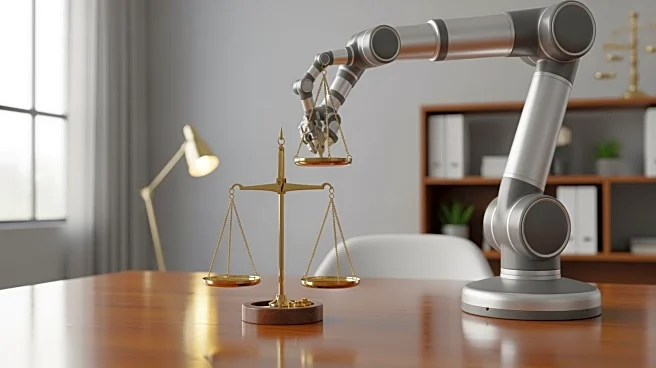What's Happening?
Law firms are increasingly adopting generative AI technologies to transform their traditional business models, according to a new white paper from DISCO. The report, which surveyed 112 legal professionals, highlights a growing pressure within the industry
to integrate AI solutions. This shift is driven by the need to remain competitive and avoid obsolescence, akin to the fate of Blockbuster Video. The survey reveals that 43% of law firm participants and 64% of in-house legal departments feel compelled by leadership to adopt AI. The traditional billable hour model, a cornerstone of Biglaw, faces challenges as AI can significantly reduce the time required for tasks like document review. This technological advancement necessitates a reevaluation of billing practices and the potential reduction in the number of junior lawyers required for routine tasks.
Why It's Important?
The integration of AI in law firms represents a significant shift in the legal industry, with potential impacts on employment, billing practices, and client relationships. As AI reduces the time needed for certain legal tasks, firms may need fewer junior lawyers, altering traditional career paths and employment opportunities. Additionally, the pressure to maintain revenue could lead to changes in billing structures, such as moving away from the billable hour to value-based pricing. This transition could affect how clients perceive and pay for legal services, potentially leading to increased costs despite efficiency gains. The broader adoption of AI in legal practices underscores the industry's need to adapt to technological advancements to remain viable and competitive.
What's Next?
Law firms are likely to continue exploring and implementing AI solutions to enhance efficiency and maintain competitiveness. This may involve redefining billing models and exploring new revenue streams to offset potential reductions in billable hours. Firms will need to balance the integration of AI with the retention of human oversight to ensure quality and reliability in legal services. As the industry adapts, there may be increased collaboration between legal professionals and technology providers to develop tailored AI solutions that meet specific legal needs. The ongoing evolution of AI in the legal sector will require continuous assessment of its impact on business models and employment practices.
Beyond the Headlines
The adoption of AI in law firms raises ethical and cultural considerations, particularly regarding the balance between technology and human judgment. While AI can enhance efficiency, it cannot fully replace the nuanced decision-making and ethical considerations that human lawyers provide. This shift also prompts a cultural change within law firms, as traditional practices and hierarchies are challenged by technological advancements. The legal industry must navigate these changes carefully to maintain trust and integrity while embracing innovation.















